Round 3 of Pittsburgh Chess Club tournament: the difficult opponent, and revenge of the Bishop
Last week, I discussed the fact that my round 2 opponent faced me having lost eleven straight games against me.
Fear and trembling
This week in round 3, I was somewhat in his position, against my opponent. Although I am higher rated than my opponent, who is also an Expert, I had a terrible record against him when we played twice almost two years ago:
- In our first game, with White, I had a totally won position but repeatedly failed to finish him off, and even went into an end game two Pawns up that was completely winning, but ended up dropping one and drawing. It was one of the most traumatic games in my entire life.
- In our second game, with White again, I was so mentally unsettled that on my fourth move in the opening, I inexplicably played a move I had never played before (instead of my usual continuation), then after my poor fifth move had a terrible position that I never recovered from, and I lost.
Furthermore, some months before playing him, I had played his son as Black, and lost a game in which I had a totally won position.
So there was a lot of emotional baggage for me going into tonight’s game.
Today’s lessons
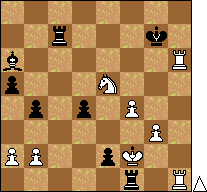
- In a very long and tough game (almost four hours), I managed to avoid psychologically falling apart, and came through.
- As opposed to my game from round 1, this game saw the revenge of the Bishop versus the Knight.
The complete annotated game
At your convenience, you can enjoy playing over the game with my annotations, including diagrams.
Preparation
I had never had Black against my opponent before. I had some memories of having casually seen him play both d4 and e4 as his opening moves.
Since I have been very busy, I did not really do any opening preparation for this game, other than quickly reviewing the Veresov Opening that his son had used against me two years ago.
Overview of my game
The opening
Ironically, if I had actually studied the Veresov Opening more for this game, it would have helped a lot, because my opponent actually did play the Veresov against me!! We played exactly the first nine moves that I had played with his son two years ago, the Veresov Gambit, in which White sacrifices a Pawn in hope that Black’s weakened King side will allow White to eventually break through to the King.
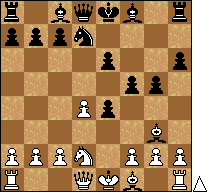
Black’s task is conceptually very simple: hold onto the Pawn, protect the King, and eventually catch up on development, especially, the Queen Bishop that is temporarily quite blocked in.
I prefer Black’s chances. I used to play the Veresov as White, actually, many years ago, but nowadays I only play it for Black.
Since a prominent book on the Veresov Opening advised against the line I choose to play for Black, here is a note on chess opening books.
Opponent avoided his son’s mistake
At move 10, my opponent deviated from the poor move that his son had played against me two years ago. That move had led to a much better game for me:
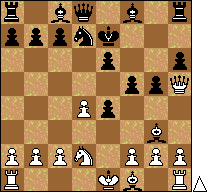
Important position
In the current game, the following important position was reached:
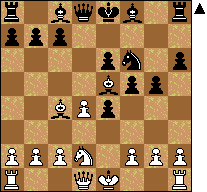
Objectively, White has compensation for the Pawn, but Black is fairly safe so far.
Cowardice or mind-reading?
I had not studied this position ahead of time, alas, so I started going astray somewhat. We reached this equal position:
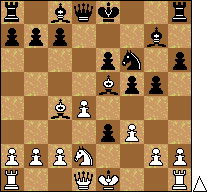
My intention all along had been to follow up logically, protecting the e3 Pawn by playing f4:
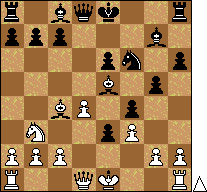
This would have maintained equality.
Instead, I panicked. I decided I wanted to give back the Pawn for a worse position, in order to guarantee that my King was safe.
I’ve made this kind of error before, so it’s disconcerting to report that I did it again. Two months ago I had another game as Black in which I chickened out of a logical Pawn advance in order to “protect” my King.
Anyway, we reached this position, in which White could and should have regained his Pawn:
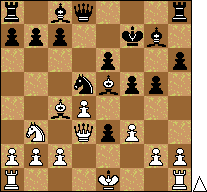
My opponent refused to play the obvious and best move to regain the Pawn.
Actually, I had gone into this line partially expecting that he might not feel like regaining the Pawn. He is an aggressive player and is more likely to try to continue pressure than to quickly regain sacrificed material. So it’s not actually clear to me whether my “cowardice” was actually a psychologically valid gamble. I do know that I’m not comfortable playing in this subjective way: if I were playing this opening variation again, against anybody, I would choose the objectively best moves that I knew.
The middle
As a result of White keeping the position blocked, the game remained equal, and we reached this important position:

We both started playing inaccurately; for example, at this position, I could have pressed for an advantage by beginning a Queen side attack properly with a5 to drive back White’s Knight and then c6 and b5 to attack White’s Bishop:
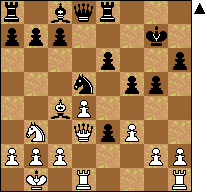
Instead, I messed up my move order and went for White’s Bishop first instead, weakening my c5 square for White’s Knight:
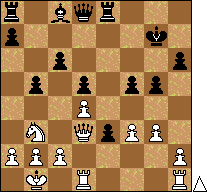
Black is a Pawn up, but the Bishop is extremely bad. You might wonder how this game illustrates the “revenge of the Bishop”! You’ll see how this accidentally happened.
After some more moves (many non-optimal), we reached a position in which I (correctly) felt that Black was in some trouble, and so I decided to try to bail out into an ending by trading Queens:
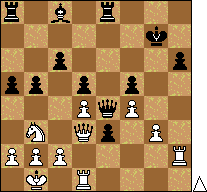
The ending
White made the error of allowing the Queen trade, after which, magically, Black’s Bishop escaped its prison:
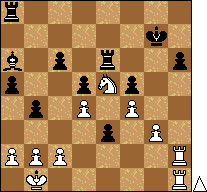
Now, White’s Knight is extremely powerful, so objectively, the game is probably a draw, since Black’s extra Pawn on e3 is not going anywhere.
But White started slipping, in an attempt to break through on the King side.
Sacrificing a Pawn for open lines for the Bishop and Rook
At a critical position, in which White was trying to win my unprotected f5 Pawn, I offered a sacrifice in order to break open the c file:
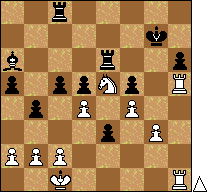
White faltered, accepting the sacrifice, regaining the originally gambited Pawn, but this was a losing plan.
Move order subtlety again
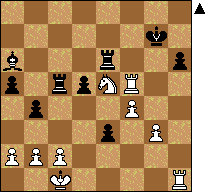
In this critical position, I should have played Re7 winning immediately. I used a different move order in my plan, but White should have been able to defend.
Finally, I made another move order error, playing e2 first and then Re7, instead of vice versa, that also should have resulted in a draw. In this critical position, White has an amazing resource to draw (which the computer found; see the fully annotated game):
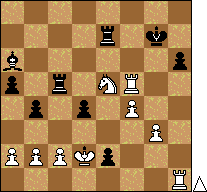
The annotations also contain analysis showing that if Black had changed his move order, this drawing resource would have amazingly not been possible.
Giving up
Instead of finding the drawing resource, White spent twenty minutes thinking and finding nothing, and playing an obviously losing move:
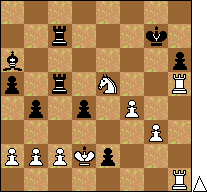
White finally resigned:

Lessons learned
- It would have been better to do detailed study on an opening line that is risky.
- Regain a sacrificed Pawn at the right time, but not at the wrong time.
- Don’t make your own Bishop bad and your opponent’s Knight good.
- If your Bishop is bad, try to make it good and maybe it will come through for you.
- Many critical moments involve choosing to trade a piece or not to trade it, because the fundamental character of the game often changes.
- As is usually the case when I am playing against someone who is not far weaker or stronger than me, the game was very tense and had many psychological aspects to the struggle.
- A game as long and as complex as this one has many critical points at which someone could have seized the moment in order to gain a large advantage or win, or could have seized the moment in order to survive after an inaccuracy by the opponent.
- I am fairly pleased that I overcame my bad record against my opponent and finally won a game from him.
What next?
Next week for round 4 I presume I will get to play White, against another fellow Expert. It turns out I will be playing against the same guy I struggled for a draw with in the final round of the last Tuesday night tournament. Obviously, I would like to improve on that experience. I have the same choice as White as I had then: do I play into his favorite opening, or play something else? And I’m sure he’s thinking the same thing now too.
Conclusion
In a hard-fault game with some high psychological stakes, because of my poor record against my opponent, I managed to come through and win. I’ve tried to objective in my analysis of the game, and show how there were missed opportunities on both sides. And I hope to continue learning from my mistakes.

Bravo! Bravo!